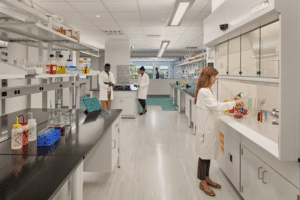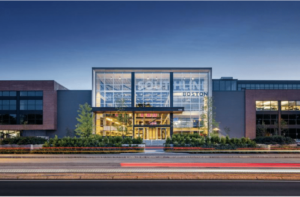
Portal Innovations and Flagship Pioneering are providing shared lab space for early-stage biotechs at the Southline development, which is counting on life science companies growing in place at the 750,000-square-foot former Boston Globe headquarters. Photo by Robert Benson Photography | Courtesy of Beacon Capital Partners
The life science industry is well-known for its tendency to cluster in real estate submarkets where companies of various sizes can network, expand and give employees maximum opportunities for career advancement.
Boston-based Beacon Capital Partners is attempting to establish the region’s newest biopharma cluster at the former Boston Globe headquarters in Dorchester, a neighborhood that’s largely been bypassed in the past decade’s explosive industry growth spurt.
Southline’s developers went directly to the source of biotechs’ funding, the venture capital industry, to sell investors on the concept of creating a new life science ecosystem under one roof. The first two life science tenants were not individual startups, but VCs that both invest in biotechs and provide them with shared lab space: Flagship Pioneering and Portal Innovations.
“While Boston is not an emerging biotech market, Dorchester is, and it’s an attractive area for us to be in given how we identify new opportunities and investments,” said John Flavin, CEO of Chicago-based Portal Innovations.
With the potential for more than 300,000 square feet of life science space at Southline, the building gives Portal Innovations’ portfolio companies an opportunity for future expansion on-site without disruptive relocation for employees, he said.
Amid a more conservative investing climate, “these companies are going to incubate longer, and they want to grow in a continuum of space,” said Flavin, who founded three biotech companies that went public.
Portal Innovations’ startups currently occupy 25,000 square feet at Southline, with an expansion to 60,000 square feet planned in May. Some space may eventually be rented to non-portfolio companies, Flavin said.
Portal Innovations raised $100 million last spring and is investing $25 million apiece in biotechs at Southline and other emerging life science markets, including Beacon Capital’s nearly-completed Texas Medical Center Helix Park in Houston, along with locations in Chicago and Atlanta. The firm’s major investor is CalSTRS, the $308 billion pension fund for the California teachers retirement system.
Portal Innovations’ business model is to invest seed funding up to $500,000 and series A rounds up to $3 million in biotechs that show promising growth prospects. It leases the real estate and invests in the shared lab infrastructure for its portfolio companies, Flavin said.

Beacon Capital acquired the former Boston Globe offices and printing plant for $362.5 million in 2021 from Nordblom Co., putting over $64 million towards a reuse and repositioning strategy. Image courtesy of Beacon Capital Partners
The other biotech VC at Southline, Flagship Pioneering, established its first Greater Boston presence in another emerging biotech submarket, Somerville’s Union Square, leasing more than 1.7 million square feet at Boynton Yards. It took a more conservative growth strategy to Southline, initially leasing 45,000 square feet. Current tenants include Ampersand Biomedicines, ProFound Therapeutics and other thus-far-undisclosed startups, spokesperson Olivia Offner said.
Repositioning Along the Red Line
Beacon Capital acquired the Southline property for $362.5 million in 2021 from Nordblom Co. and received nearly $427 million in financing from Goldman Sachs, putting the additional funding toward the high-profile reuse and repositioning project alongside the Southeast Expressway.
As a lure for the first tenants, Beacon Capital built out building infrastructure for more than 100,000 square feet of spec lab space, said Steve Purpura, president of Beacon Life Science.
But lab developers face mounting challenges in a market which was rapidly extending growth shoots beyond traditional hubs such as Cambridge and Lexington into once-industrial cities such as Somerville and Watertown and further-flung suburbs such as Burlington.
Amid industry cutbacks and declining venture capital funding since mid-2022, life science leasing has been gravitating back to the traditional core markets, according to brokerage research.
As biotechs conserve cash and continue to list sublease space, all of Greater Boston’s major lab submarkets have double-digit availability rates. According to CBRE’s third-quarter report, even the coveted East Cambridge submarket has a nearly 14 percent availability rate, equivalent to over 2.3 million square feet of options for tenants.
So why would biotechs take a flier on a 65-year-old former newspaper building off Morrissey Boulevard, a nearly 30-minute subway ride from the Kendall Square industry hub?
“We are an urban location in Boston on the [MBTA] Red Line that offers an attractive value option to East Cambridge and Seaport,” Purpura said.
The life science talent pool shows signs of migrating south of downtown Boston following the development of the Seaport District in the past decade, Purpura added.
Stantec, the Southline architect, identified the former press room for a 5-story atrium and amenities section including a food hall. Up to 360,000 square feet of office space is located in the south wing of the building, including 96,000 square feet occupied by sports apparel brand Nobull.

Steve Adams
Spreading the Wealth to Underserved Communities
Trade groups such as MassBIO have made a priority of spreading its benefits to urban neighborhoods, Gateway Cities and areas outside of Greater Boston largely untouched by an industry that employs nearly 114,000 statewide. Responding to pressure from Boston officials, life science developers are incorporating workforce training centers into new lab projects including programs targeting entry-level positions for high school graduates.
Beacon Capital approached MassBIO about locating a new training center at Southline, said Zach Stanley, executive director of the facility named Bioversity scheduled to open in January.
The trade group recently hosted a pair of information sessions for potential students seeking entry-level jobs in the industry. Beacon Capital is contributing to the buildout of the 4,000-square-foot classroom and training lab, Stanley said.
“We’re outfitting it to replicate what somebody would find in a local biotech R&D lab. It’s not going to be as expansive, but it will be a lot of the similar equipment, so training will take place in as real world an environment as possible,” he said.






